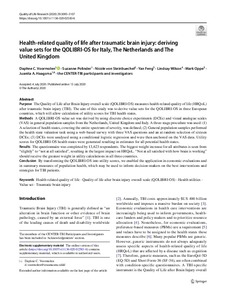Health-related quality of life after traumatic brain injury: deriving value sets for the QOLIBRI-OS for Italy, The Netherlands and The United Kingdom
Voormolen Daphne C; Polinder Suzanne; von Steinbuechel Nicole; Feng Yan; Wilson Lindsay; Oppe Mark; Haagsma Juanita A; CENTER-TBI participants and investigators
https://urn.fi/URN:NBN:fi-fe2021042823586
Tiivistelmä
Purpose
The Quality of Life after Brain Injury overall scale (QOLIBRI-OS) measures health-related quality of life (HRQoL) after traumatic brain injury (TBI). The aim of this study was to derive value sets for the QOLIBRI-OS in three European countries, which will allow calculation of utility scores for TBI health states.
Methods
A QOLIBRI-OS value set was derived by using discrete choice experiments (DCEs) and visual analogue scales (VAS) in general population samples from the Netherlands, United Kingdom and Italy. A three-stage procedure was used: (1) A selection of health states, covering the entire spectrum of severity, was defined; (2) General population samples performed the health state valuation task using a web-based survey with three VAS questions and an at random selection of sixteen DCEs; (3) DCEs were analysed using a conditional logistic regression and were then anchored on the VAS data. Utility scores for QOLIBRI-OS health states were generated resulting in estimates for all potential health states.
Results
The questionnaire was completed by 13,623 respondents. The biggest weight increase for all attributes is seen from "slightly" to "not at all satisfied", resulting in the largest impact on HRQoL. "Not at all satisfied with how brain is working" should receive the greatest weight in utility calculations in all three countries.
Conclusion
By transforming the QOLIBRI-OS into utility scores, we enabled the application in economic evaluations and in summary measures of population health, which may be used to inform decision-makers on the best interventions and strategies for TBI patients.
Kokoelmat
- Rinnakkaistallenteet [29337]
